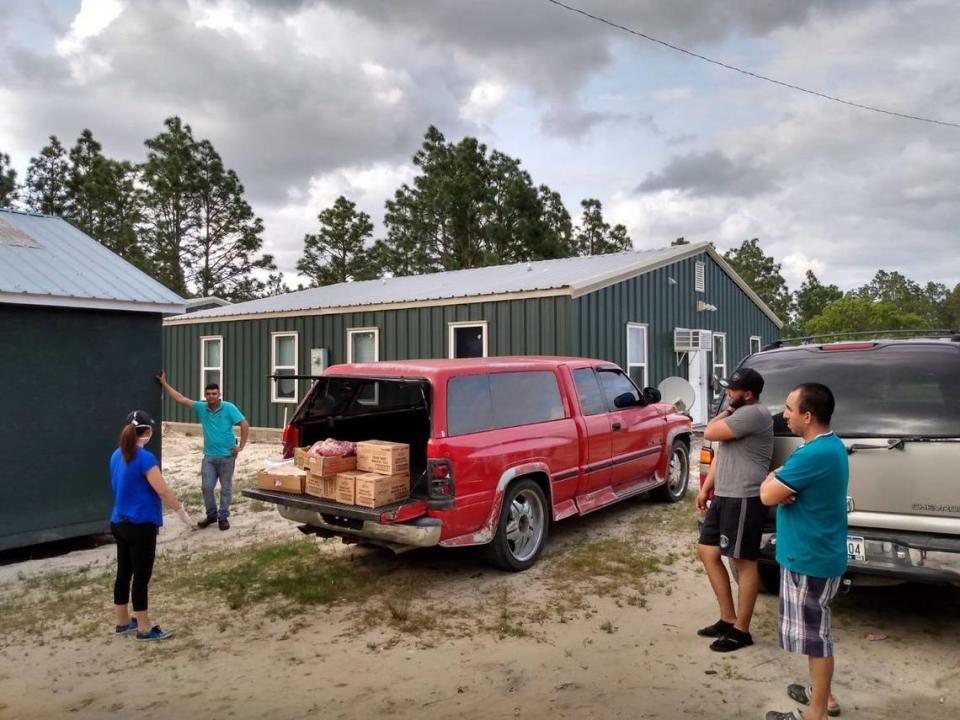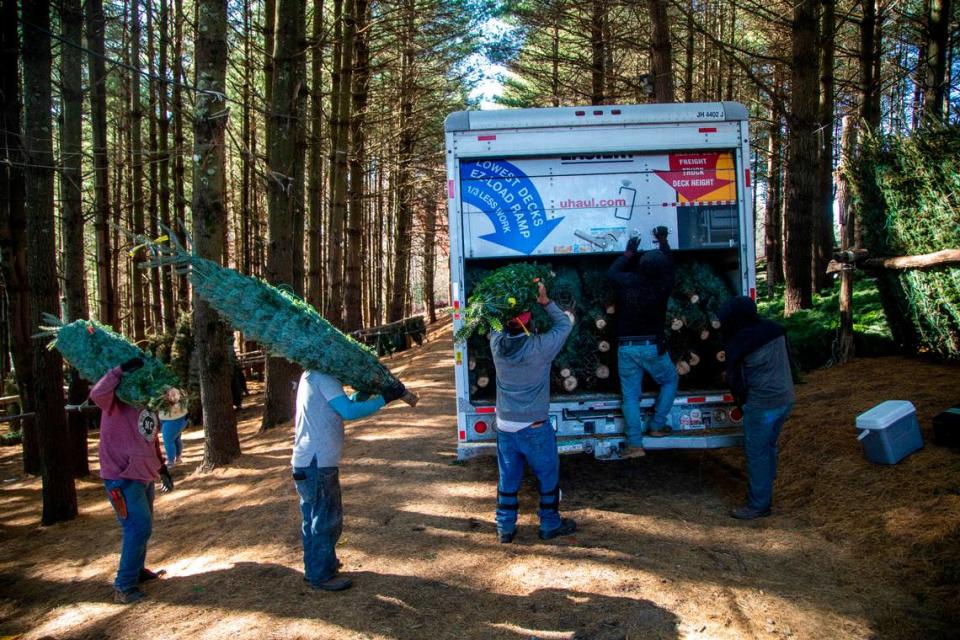Some NC migrant farmworkers face foul housing, low pay and forced travel, lawsuits say
Each year, some 15,000 H-2A visa holders come to North Carolina to work temporarily on farms and in greenhouses across the state.
They harvest crops, drive heavy machinery and operate agricultural equipment, filling jobs that farms otherwise could not, experts say.
In return, the temporary workers can make substantially more money than they could in their home countries.
Many farms treat workers as the law requires. But several federal lawsuits filed recently allege that the H-2A program is sometimes misused to abuse, steal from and even traffic legal workers.
In some cases, the visa holders are charged bogus fees and travel costs that can total thousands of dollars before they even reach the state. Those workers arrive here in debt to and reliant on the very people who cheat them.
“The way the system is made up, where workers have to stay quiet in order to return and come back next year, gives opportunities for people to do what they want with them,” said Leticia Zavala of the nonprofit It’s Our Future.
Marshall Wall, a defense attorney who has represented several North Carolina farm labor contractors, said the increasing number of human trafficking allegations by H-2A visa holders could be an attempt by the workers to stay longer in the country. U.S. policy allows some victims of severe human trafficking to stay here for up to four years.
“Part of the rise in claims of ‘human trafficking’ in civil lawsuits seems to mirror a rise in the number of requests for visas based on the contention that the person has been a victim of trafficking or of other criminal activity,” said Wall said..
But allegations of abuse in the lawsuits are diverse. For example:
Forced to work construction
Axel Enrique Campos Arroyo left Mexico in 2022 to harvest sweet potatoes, tobacco and cucumbers in eastern North Carolina. He’d been recruited by U.S. farm labor contractors who promised $14.16 an hour — much more than Arroyo could make back home, a 2023 federal lawsuit states.
Arroyo paid his recruitment costs, travel costs, visa application fee and border crossing fee, even though farm owners or third-party labor contractors are supposed to cover those payments, according to H-2A regulations.
The fees and travel costs left Arroyo in debt and reliant on his new employer, Lamm Farms, for money, the lawsuit states. So when he was told that he’d have to also work on a construction site, owned by a relative of the farm labor contractor, Alvarado’s Harvesting, Arroyo complied.
Arroyo was paid less than $7.25 an hour for all the hours he worked, the lawsuit alleges.
Then his passport was confiscated, taking away the only legal documentation he had.
Arroyo and others were told that the passports had a tracking chip embedded in them, and the farm owners “would be aware of their location if they ever took their passports and left their employment,” the lawsuit states. When they were found, they’d be arrested and sent back to Mexico.
In August 2022, Arroyo escaped the farm. He walked to a nearby gas station where his brother, who lived in Montana, had a car waiting to take him to a Raleigh hotel.
His lawsuit against Lamm Farms, LLC; Alvarado’s Harvesting, LLC; and Real Constructions, LLC is pending. Lamm Farms and Alvardo’s Harvesting could not be reached for comment.

Taken out of state, billed for poor housing
Luiz Guzman Rojas and Feliciano Velasco Rojas, two men from impoverished Mexican towns, came to North Carolina to pick blueberries on H-2A visas, a 2023 federal lawsuit states.
Not long after arriving in 2017, an associate of the grower, First Pick Farms, gave the workers fake IDs, put them on a bus and drove them to Michigan, where they labored on another farm — as much as 12 hours a day, seven days a week, according to the lawsuit.
The associate made the workers pay for the cross-country trip.
In Michigan, the workers had to pay to stay in a house they shared with dozens of other temporary workers. It was “an unfurnished, dilapidated, and overcrowded house wherein the workers had to sleep on the floor,” the lawsuit states.
Federal rules prevent H-2A workers from being moved to farms not listed on the visa application and require that workers be provided free housing.
If the workers tried to escape, they’d be holding fake identification cards and arrested, they were told. If they complained, they’d be sent back to Mexico in debt.
“Following the 2017 blueberry season, on or about September 2017, Defendants transported Plaintiff and other workers back to North Carolina where the workers finally managed to escape employer control,” the lawsuit, which is pending, states. First Pick Farms could not be reached for comment.
Bait and switch on waiting jobs
In 2020, three women boarded a bus from Mexico and made their way to eastern North Carolina to cultivate and harvest sweet potatoes, melons and other crops. They paid for their visas and travel to the U.S. with the promise of making $12.25 an hour.
But when the women arrived, they were told to work in the farm’s kitchen, cooking meals for other farmworkers, a 2021 lawsuit states. The work paid them only a fraction of what they were promised.
One woman immediately fled. The other two were afraid, scared they’d be arrested and deported if they were caught running.
While at the farm, the remaining women worked as many as 100 hours a week with no overtime pay, the lawsuit alleges. One was not given enough water or food, prodded with hot objects, including a lighter, had her hair and eyelashes burned on a gas stove and raped, the lawsuit alleged.
In 2023, farm labor contractors José M. Gracia Harvesting, Inc., José M. Gracia, and Gracia & Sons, LLC settled the lawsuit, paying the women more than $102,000.
Jose Gracia declined to comment.

Filthy bedding, required to buy food
In 2018, a group of Mexican workers left their homes with H-2A visas in hand to work in eastern North Carolina’s blueberry fields. They would make $12.26 an hour, they were told.
But a recruitment scheme, which charged the workers fees and travel costs, left them in “crippling debt,” a 2020 federal lawsuit states. And when they got to North Carolina, they were housed in a bus, outdoors or in labor camps or barracks with filthy mattresses, snakes and no hot water, at times.
The workers “had no way to purchase and/or prepare meals, launder their clothing, or bathe,” the lawsuit states.
In April 2022, the visa holders settled the lawsuit for $120,000.
Francisco Valadez, Jr., the farm labor contractor in the case, denied the workers’ claims. He told The Observer that he settled the lawsuit because he couldn’t afford mounting lawyer fees.
Sexual assault, illegal debt
In 2020, after travel costs and paying as much as $5,200 in illegal fees to make their way to North Carolina, 13 Mexican H-2A visa holders were left in debt and at the mercy of farm labor contractors, a federal lawsuit alleges.
The migrants were promised $12.67 an hour — the required federal rate for H-2A visa holders at the time. Some were paid less than $7.25, the minimum wage, the 2022 lawsuit states.
The contractors threatened to deport anyone who fled.
In one instance, a contractor pulled a knife and sexually assaulted a worker who he said did not pay her recruitment fee.
The woman escaped two weeks later, leaving the camp in the middle of the night. As many as eight other workers would also run from the camp.
The lawsuit is pending.
Illegal debt, shoddy housing
In 2015, 13 H-2A visa holders from Mexico each paid U.S. farm labor contractors as much as $2,000 for the chance to harvest tobacco and sweet potatoes in eastern North Carolina, a federal lawsuit states.
They also paid visa fees, border crossing fees and for food, lodging and travel to North Carolina, where they were told that they’d make $10.32 an hour — substantially more than they could make in Mexico. Under federal law, the farm owner or labor contractor, third parties who recruit migrant workers, must cover those costs.
According to the lawsuit, filed in 2017, the three contractors in this case were struggling financially. So they charged the H-2A visa holders exorbitant application fees, paid them less than minimum wage and never reimbursed them for the upfront costs, lawyers argued.
The contractors also took away the workers’ Social Security cards and provided shoddy housing, where windows and plumbing pipes were broken and water, at times, was cut off, the lawsuit states.
“This is what labor trafficking looks like,” said Catilin Ryland, the plaintiff’s attorney, in 2019, when the contractors settled the lawsuit for $75,000.
$720,000 in back pay
Ten former H-2A workers alleged that between 2015 and 2017, an eastern North Carolina farmer and a farm labor contractor failed to reimburse the migrants for their travel expenses and failed to pay them their full wages, a 2017 lawsuit states.
The workers were brought to Greene County, southeast of Raleigh, to harvest sweet potatoes for $10 or $11 an hour, depending on the year.
In a 2021 settlement agreement, Ham Farms agreed to pay the workers $600,000. Gutierrez Harvesting settled for $120,000, records show.

